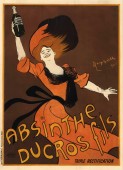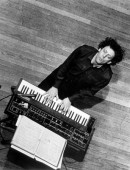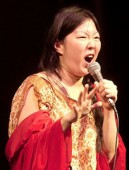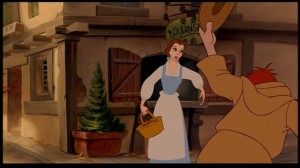Scene but not Heard
from Wednesday, July29th of the year2009.
This is part of a co-blogging exercise (the second, in fact “” link here to the first) with Amanda Ameer at Life’s a Pitch. Amanda is a classical music publicist (although not my publicist; I don’t have a publicist but I would probably hire Amanda if I hired anybody; she plays the harp) so dealing with the perception of musical scenes seems more her department than mine. With any luck, she and I can tease out some good questions. Check her post out here, and then come back to mine.
A lot of times when I’m abroad and people get wind that I’m a musician who lives in New York, they inevitably ask me, “what’s the scene like in New York?” It’s one of those difficult questions to answer, because I know what they’re asking, and I know how I’m meant to respond (or at least, I think I understand the expectation). I get confused, though, because I feel like I don’t really know how Scenes, such as they are, function in New York, or, for that matter, anywhere.
Part of my resistance is rooted in my deep-seeded, gut-level resistance to precisely that form of classification of musicians. In my experience, composers who announce themselves to be part of a specific scene (Uptown, Midtown, Downtown, Crosstown, Chinatown, Crazytown, Post-Modern, Post-Minimal, Pre-Labor, Post-Industrial) write the grimmest music which constantly and desperately attempts to situate itself in its stylistic vessel like a dog in a moving car. In my fantasy world, Scenes are, in fact, just quick polaroids of who happens to be in a certain place at a certain time. In  school, we’re taught that fin-de-siècle Paris was a very specific scene: we fantasize about Picasso and Stravinsky and Ravel and Debussy sitting around a table, drinking Absinthe and smoking skinny cigarettes. Maybe that even happened one day! Maybe it happened every week! But to what extent, I wonder, does that make sense only when viewed a century later, and, to what extent are we New York musicians involved in producing (or resisting) our fantasy versions of the past?
school, we’re taught that fin-de-siècle Paris was a very specific scene: we fantasize about Picasso and Stravinsky and Ravel and Debussy sitting around a table, drinking Absinthe and smoking skinny cigarettes. Maybe that even happened one day! Maybe it happened every week! But to what extent, I wonder, does that make sense only when viewed a century later, and, to what extent are we New York musicians involved in producing (or resisting) our fantasy versions of the past?
 One of the New York musicians I respect the most is Philip Glass “” not just because of his music, but also because of how he behaves as a citizen of the community he inhabits. By self-publishing, he employs a small staff of four. Until recently, he owned a medium-sized recording studio, employing about six full-time and maybe six more part-time. His ensemble consists of musicians who, despite the fact that they each have many other gigs as players, teachers, and composers, rely on touring and recording. The end result is a small, instant community revolving entirely around one man’s music. It’s a fascinating thing: a composer employing others, but in turn, making himself responsible to his community “” he can’t take nine months off and go to Rishikesh in a loincloth: people are depending on his output to make a living.
One of the New York musicians I respect the most is Philip Glass “” not just because of his music, but also because of how he behaves as a citizen of the community he inhabits. By self-publishing, he employs a small staff of four. Until recently, he owned a medium-sized recording studio, employing about six full-time and maybe six more part-time. His ensemble consists of musicians who, despite the fact that they each have many other gigs as players, teachers, and composers, rely on touring and recording. The end result is a small, instant community revolving entirely around one man’s music. It’s a fascinating thing: a composer employing others, but in turn, making himself responsible to his community “” he can’t take nine months off and go to Rishikesh in a loincloth: people are depending on his output to make a living.
All of this is a long way of asking: is that model a sort of modern scene of sorts? Is that not a more intimate musical connection than the imagined scene that connects Philip Glass, Steve Reich and Terry Riley? Do they rely on each other for health care? Are they on the road together, drinking rider wine and eating backstage hummus?
I think that we’re meant to look back on Scenes from the Past with a great deal of reverence, but I have always been suspicious of how quickly those things dissolves into acrimony. I remember reading something once that Debussy said something nasty about Stravinsky and I was all, but you’re supposed to be FRIENDS! How can this happen! It was, like, personally offensive. Similarly, we’re meant to look back at the Fluxus Movement as a kind of idealized moment: was it? Where they at now? The last time I checked in on them, they were not returning Kyle Gann’s phone calls and being territorial about intellectual property.
(A side note: Kyle’s blog is hosted as part of the same umbrella organization as Amanda’s. Scene!? Scene!?)
A record label can also be an organizing model for a musical community. The label I’m on, Bedroom Community, is based explicitly on the idea that all of the artists on the label can (and do) work with each other in a free-flowing (read: not always paid) exchange. Loosely summarized, there’s a folk-singer, a goth-minimal Australian personality cult, me, a producer/composer of bright, organic electronic music: not necessarily the most stylistically coherent scene. And yet: it functions as something like a scene. We meet up six or seven times a year, talk about music, deal with each others’ families. One of their daughters is clinging to my leg as I write this paragraph; another’s son is waiting for me to drive him to the pool. We play each other our music constantly, and if we’re not in the same place, it happens over IM.
Having said all of this, the New Music Scene, as it exists in other people’s imaginations, is surprisingly incoherent. There is a weird six-degrees-of-separation to it, but the nature of the field, such as it is, has weird numbers working against it. Composers will naturally meet far more players than other composers; that’s just how it works. You write a string quartet and it’s one of you, and four of them. You write an orchestra piece, it’s one of you, one conductor, six or seven artistic/production administrators (don’t forget about them, by the way; they are as integral to the workings of music as oboists), and like sixty-eight players. So I could safely say that the Scene I inhabit consists of a bunch of ace musicians I work with on a pretty regular basis: violist Nadia Sirota, flautist Alex Sopp, Thomas Bartlett a.k.a. Doveman “” etc. Then, naturally, there are other composers who work with them: Judd Greenstein being the best example of somebody who exists at a hub/crossroads of a community.
Now, here’s where it gets interesting. New Amsterdam Records is, in a way, one of the best things to happen to new music in a long time. Their mission statement states,
New Amsterdam Records was formed as a haven for the young New York composers and performers whose music slips through the cracks between genres. The records we sell will paint a certain picture of that scene without a name, without trying to give it one.
They have a roster of a few dozen artists, a few dozen albums. It’s a much more inclusive label than Bedroom Community, which has been around twice as long and has a fraction as many releases. It’s recently begun promoting concert series (Amanda has more about this at her post). And, it has released many, many albums! Some of these albums have my music on them! Some of them feature Nadia! So there’s a natural connection, and I get asked about it a lot: What’s the New Amsterdam Scene Like? And here is the weird secret: I barely know half of the people on this label; some of them I haven’t met, others I literally don’t know if it’s a person or an idea or a disease or an ensemble; what is this Darcy James Argue? I feel like despite how close I am to it, I have almost no access to whatever Darcy James Argue might even be “” I thought it was maybe some kind of litigation technique; it turns out it’s a human being “” and it’s kind of shocking to me to be so intimately connected to things and yet not be marketed to about what it actually, factually Is. This is sort of where Amanda comes in: is it a good thing that the Scene, such as it is, has a take-it-or-leave-it attitude about marketing to its inner circle? or is it the case that somethings you can’t see the things that are closest to you?
To hear more about this stuff, by the way, check out me talking on the New Amsterdam Website about Nadia’s record here.
There is a danger of stylistic concerns being the basis for community organization. Just because we’re on the same label doesn’t mean we’re going to be a mutually compatible species. I’m sure it’s like this in the indie rock world: if you’re compared to somebody, it’s kind of infuriating and you end up disliking their music. Or worse yet, there is a guilt by association. I have a piece for a singing banjo player who also plays guitar and sometimes fiddle; we did it in London and somebody came up and said, oh, you must know this Jody Redhage, she’s on New Amsterdam! And I thought,  well, that’s strange, I totally don’t know her, let me investigate, I like the cello. Now. Beloveds. It may be executed well “” that is, I think, outside of my ken and it pains me to even be mean, but when I heard this thing, mommy was shock. In terms of conceptual grounding, it lies so far from anything I can even understand “” it scares me the same way that, I imagine, sensible Republicans are horrified by those Birthers running around on cable television. I guess what I’m getting at is, does the fact that this community (as loosely articulated as the New Amsterdam family) has supported something that I find to be Literally Appalling mean that I am not ever really able to be fully part of the community? or is this kind of fundamental disagreement exactly the kind of thing that keeps the community interesting? It does feel very Political.
well, that’s strange, I totally don’t know her, let me investigate, I like the cello. Now. Beloveds. It may be executed well “” that is, I think, outside of my ken and it pains me to even be mean, but when I heard this thing, mommy was shock. In terms of conceptual grounding, it lies so far from anything I can even understand “” it scares me the same way that, I imagine, sensible Republicans are horrified by those Birthers running around on cable television. I guess what I’m getting at is, does the fact that this community (as loosely articulated as the New Amsterdam family) has supported something that I find to be Literally Appalling mean that I am not ever really able to be fully part of the community? or is this kind of fundamental disagreement exactly the kind of thing that keeps the community interesting? It does feel very Political.
In all fairness, the thing that makes me anxious about the Jody Redhage project is that there is an enormous stylistic overlap with one of the strangest, most difficult to listen to pieces that I just adore, namely, Michael Nyman’s The Kiss, which was written for Dagmar Krause and Omar Ebrahim; it’s Really Weird.. Anyway, check them both out below:
[audio:01 The Kiss.mp3]
Michael Nyman The Kiss
[audio:02 All Summer In a Day.mp3]
Jody Redhage All Summer in a Day
You see what I mean? It’s like: so close, and yet so far. Redhage gets at the same weird and crunchy major-on-major violence that Nyman does. I also like her Meredith Monk trick. Also “Warning Song” is kind of cool; I’m not convinced that hers is the voice that should be singing it, but the cello playing sounds pretty hot. It’s not that I hate it, I don’t even hate it. It just makes me Very Nervous because it’s happening very close to my house.
I know that Amanda is touching on this in greater detail, but one of the most easy-to-identify scenes in New York is the Bang on a Can Scene, which I think bears a lot of the support systems of the Philip Glass model as well as some of the more problematic structures that come with something starting out spontaneous and ending up an institution. I wrote in detail about some of these issues here, and in re-reading what I wrote last year, I realized that my relationship to that scene is incredibly tangential “” a few years ago it was kind of Jude the Obscurey, I was like, why Яn’t these people nice to me, even though David Lang is one of my favorite composers alive? I’ve never been to Banglewood, I think that I am the only sentient being on earth not to have written a piece for the People’s Commissioning Fund (the horse grazing outside my window is working on his set of bagatelles as we speak), Michael Gordon looks at me like I’m Brüno every time we meet. I think Julia might know who I am by sight. If the Marathon is the Superbowl (or just The Marathon?) of the New York Music Scene, I must be playing a different sport. Amanda is focusing on the various ways in which she, as somebody who is intimately involved in Some Kind Of Scene, is expected to be at certain concerts. It’s an important issue: you know how sometimes you know exactly whom you’re going to see at those concerts? Zankel Hall is kind of like that, I always feel like it’s the first scene from Beauty and the Beast, but with like, Derek Bermel. Bonjour! How is your fam’ly!?


16 Comments
July 29th, 2009 at 2:03 pm
Better link for Alex: http://www.alexsopp.com/
July 29th, 2009 at 3:01 pm
“If the Marathon is the Superbowl (or just The Marathon?) of the New York Music Scene, I must be playing a different sport.”
Right on. Why paint yourself into a corner? “I would never belong to a club that would have me as a member.”
I think it’s important for composers to consistently push themselves out of their comfort zones – and that can include your borough. With that in mind, the “scene” as described by Amanda seems strangely narrow to me. No mention of musicians around John Zorn and the Stone. No mention of Harlem or the Bronx or any African American artists. No description of the forward thinking jazz and world ensembles you find at Barbes and other small clubs.
I mean…I get it – she’s not trying to throw a net over a zeitgeist. But she certainly doesn’t mirror my experiences here in NYC (going on 12 years now…) creating music.
Someone many years from now will rewrite history and break it down for us.
July 29th, 2009 at 3:35 pm
Hi there. Right – the scene I described *should* seem strangely narrow, because it’s the segments of a much broader scene that I’ve interacted with personally. Part of the point I was (trying to) make was that any map or chart I could provide to explain the New York new music scene to the world-at-large would be so personal that it would be irrelevant. I’ll come out here and say, I’ve never actually been to The Stone (!!). With that in mind, one could argue that I’m not on the new music scene at all, in which case, again, why do people assume I’ll be at every event that even remotely smells of new music?
July 29th, 2009 at 11:44 pm
As usual, your description, “mommy was shock” is one of my new favourites, right up in the limelight with “white ice princess of rage.”
July 30th, 2009 at 1:52 am
Okay so Jody Redhage was an undergrad at Berkeley at the same time that I (whom you sort of know) and Mason Bates (whom you went to Julliard with) were both grad students there. One or both of us could have had been her TA? SCENE!!
July 30th, 2009 at 7:25 am
Amanda,
There’s so much music to explore in NYC, it’s impossible to be on top of it all.
Whenever I meet a musician and mention one or two other players I think they might know, 9 times out of 10 they’ll reply “Huh! I don’t know him/her…”
And yet, there is a 6 degrees of separation thing happening in NYC when it comes to anyone who makes noise with an instrument.
However, when I read PR that repeatedly touts how X composer or ensemble is “Breaking barriers” and/or “Tearing down walls” etc…all I can think of is how many walls that are still up waiting to be knocked down.
But maybe all that means is we all have plenty to keep us (musicians and PR people) busy…
July 30th, 2009 at 7:42 am
Does this make you the founding member of Post Scene?!
July 30th, 2009 at 9:21 pm
When I hear talk of scenes and certain music communities to me it is basically made of your friends and acquaintances, and people you feel comfortable with or are like you (or like (most of) the things you like) so naturally as Chris points out, scene as described is narrow. When those people ask Nico, “hey what’s happening in the NY scene (or with New Amsterdam)” , I don’t think they really want to know the true, messy answer, because it isn’t easy to digest; a very parochial answer based on who you know or are around doesn’t have the stamp of authority on the subject that the questioner wants. Of course, any answer to that question leaves out all of those communities (like those that Chris describes) which are possibly just as vibrant as what you do know or are a part of.
Like that comment Sarah Palin made about Alaska being a “microcosm of America”, the scenes around New Amsterdam, Bang on a Can, et al. are also not indicative of the totality of the new music scene, just as Alaska is no avatar for the US. And while I really respect New Amsterdam and what they have accomplished and have some of their artists in my group Numinous (Jody Redhage, for example) and work with some them in other capacities (Darcy Argue, in my own composer scene, Pulse), I believe that no matter how many people were in those lines for their Galapagos shows (I wasn’t one of them, unfortunately), that scene is still just mostly preaching to the same kinds of people, with the same backgrounds and likes-just a younger, hipper, but generally a similarly educated version of the same upper-crust “blue-hairs” we’d stereotypically expect to find at opera and symphony concerts. There always seems to be a bit of a clique-ish, insiderness to most scenes (think of the record shop workers in High Fidelity) but I think the real question is can you turn a scene, filled with those like minds and similar backgrounds and education, and broaden it into a movement, filled with different kinds of people not like themselves? I would hope that’s one of the goals of any of those scenes, I know it is one of mine.
August 1st, 2009 at 12:26 pm
“…I think the real question is can you turn a scene, filled with those like minds and similar backgrounds and education, and broaden it into a movement, filled with different kinds of people not like themselves?”
“How can you talk about Black Mountain and not talk about Charlie Parker?†Greg Tate
Joe, I’ve thought about this very question quite a bit. I personally want and need my performing ensembles and ideally my audiences to reflect my own world. I am interested in participating in creative environments that are diverse in gender, age, and race. The composer George Lewis talks about his own frustration performing and improvising at shows that included no women for instance. I believe that if you want to combat this sort of narrow mindedness, you need to find kindred spirits who may not be on your day-to-day radar, and invite them into your fold. Lewis did just this and left some people confused by his choice of collaborators. That’s one price you’ll pay if you already have the attention of a small, devoted “scene” I guess.
Various and different artistic “scenes” are influencing each other all the time – although this fact can go unacknowledged by the press, professors, or even the musicians themselves. John Cage spoke about his dislike of improvisation and jazz. Which to me is kind of insane, because so much of his music is about improvisation.
August 6th, 2009 at 11:05 am
John Cage’s music is not at all about improvisation! It is about chance and discipline.
August 10th, 2009 at 9:38 am
“Chance and discipline…” which, you might define as a type of improvisation, no?
Larger point being that trying to isolate different streams of concurrent (sp?) musical development (i.e. Black Mountain from Bebop) is silly because we are all influencing each other whether we want to admit it or not.
Kind of like a delta – Cage’s own natural / musical world analogy…
August 10th, 2009 at 9:57 am
“What delights me in this thing… is that the performer, the improviser, and the listener too are discovering the nature of the structure… that is to say not thinking, not using chance operations, just letting the sound be, in the space, in order that the space can be differentiated from the next space which won’t have that sound in it.”
John Cage
This reminds me of Miles Davis’ famous suggestion to John Coltrane that he just “take the horn out of his mouth” whenever he found that he couldn’t stop playing 🙂
August 10th, 2009 at 10:29 pm
In response to Joe’s comment:
“I believe that no matter how many people were in those lines for their Galapagos shows (I wasn’t one of them, unfortunately), that scene is still just mostly preaching to the same kinds of people”
Exactly! The success of the New Amsterdam scene is wonderful, but a somewhat localized one. In order to curate something that speaks to wider sensibilities, the curator has to place together Scenes that no one would dream of commingling, and yet, once they’ve been created, loosen the boundaries between communities of music and create wider audiences. Ronen’s Wordless Music series is a nod in that direction, but it could be more radicalized…
the new Bang on a Can Asphalt Orchestra project is a good example of guerilla exposure of new sounds to a fairly broad sampling of people. For me, the most interesting thing is a contemporary music program with complimentary sounds that lacks the obvious dotted lines that people within their respective scenes would make.
August 10th, 2009 at 10:53 pm
Can you please say more about “crunchy major-on-major violence”?
October 3rd, 2009 at 2:21 am
Out of interest, have you since writing this post acquainted yourself with the music of Darcy James Argue? What are your thoughts?\n\nI have! S’fine! I don’t dislike it. I think I’d rather see it live than listen to a CD, to be honest. And I figured out that D.J.A. is a human being.
October 23rd, 2009 at 10:43 am
In response to Chris Becker on Cage
I’m pretty sure no one will ever see this, but…
Improvisation is ultimately decided by the person performing. John Cage was trying to take self out of the work as much as possible to let his work mimic nature. The idea of improvisation, in the most liberal sense, is still one of complete control by the composer, while Cage’s definition of chance and discipline was to create music in a way that you’re not really the one creating it at all. Of course there are inevitable contradictions, but Cage really did stray away from any sense of improvisation…